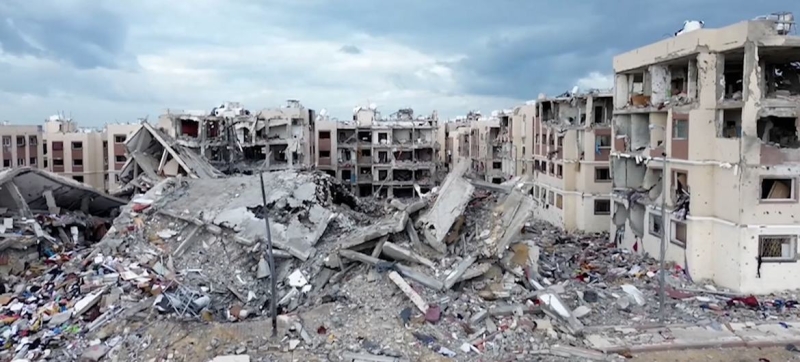
Destruction in Gaza. INTERVIEW | “Unprecedented operation”: it will take years to eliminate unexploded bombs in Gaza Peace and Security
So many bombs have been dropped on the Gaza Strip since October 7 that it will take millions of dollars and many years to clear the enclave of unexploded ordnance. Charles Birch, head of the United Nations Mine Action Service (UNMAS) in Palestine, began working with his team in Gaza long before the current conflict. He told UN News that all their previous work had been undone by the bombing of Gaza in the last six months.
BW: UNMAS has been in Gaza for about ten years. Until October 7, our main operations were based in the Gaza Strip, and we also had smaller operations in the West Bank. In the Gaza Strip, we focused primarily on clearing explosive ordnance bombs deep underground and conducting bomb threat assessments on UN sites after the escalation occurred.
To defuse the bombs, you had to dig a shaft 10-15 meters underground to get to them, then the leader of the operation, a man named Paddy McCabe, would go down into the shaft, removed the fuse from the bomb to make it safe, and then removed it from the pit and handed it over for destruction.
UN News Service: How many unexploded ordnance could be found in Gaza before October 7?
BW: We neutralized approximately one deep underground aerial bomb per month. Since the war between Hamas and Israel in 2021, we have been informed of 21 such aerial bombs, and we have almost completed this work.
It is obvious that this work has been completely negated by – for the conflict that began on October 7, and the scale of contamination will be such that working with deeply buried ammunition in the near future is unlikely. Much of our work will focus on surface munitions.
UN News Service: Final reconstruction of Gaza will be a monumental task. How important will munitions clearance be to this process?
BW: We go by the rule of thumb that 10 percent of ammo doesn’t perform as intended. There is now more rubble in Gaza than in Ukraine, and clearance of explosive ordnance must be taken into account as part of the process of clearing the rubble, which is a huge task in itself. It’s years and years of work. This will be an unprecedented operation.
UN News Service: What October 7th meant for you and your team?
BW:At the time, I was the only international UNMAS staff member in Gaza, and I had nine local staff. The first week of the war I was in the north of Gaza, on the territory of UNRWA (UN Agency for Palestine Refugees). The bombing was incredibly intense. Large munitions and rockets dropped from the air, as well as volleys of Hamas rockets coming from the Gaza Strip. The bombing was unlike anything I had ever experienced.
The UN compound was severely damaged by the explosions. It was a terrible situation. Local personnel have been scattered throughout Gaza and are now all located in the south. Two were evacuated, the remaining seven remain in Gaza and continue to work. They are incredibly dedicated to their work, despite dire circumstances.
Read also:
World Bank and UN: Property damage in Gaza estimated at $18.5 billion
There are currently four international staff in Gaza providing support to UN humanitarian convoys in the north: due to political issues, only international staff are accompanying the convoys. They allow convoys to pass unhindered – bypassing unexploded ordnance. Our local staff then provide explosive ordnance risk training, a critical component of mine action in the Gaza Strip.
What our local staff do is incredible. They really went above and beyond. Most of them lost their homes. They lost relatives and friends. This is a terrible situation.
UN News Service: How difficult is it for you as a team to deal with this situation?
BW: The only reason the team survived is because before the war we had a great dynamic and very dedicated colleagues. The local staff are fully committed to the project and this is a testament to their resilience. I’ve never seen anything like it.
UN News Service: Regarding future reconstruction, what amount will you need and how much funds do you have?
BW: The lack of funding is huge. We estimate that we will need about $45 million to begin clearing the Gaza Strip. We currently have $5.5 million. Hopefully donors will be more open to funding after the war is over because we are desperate for funds.
